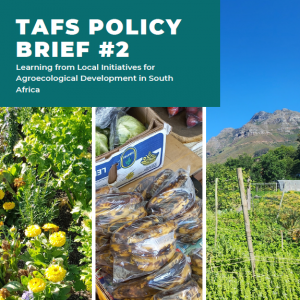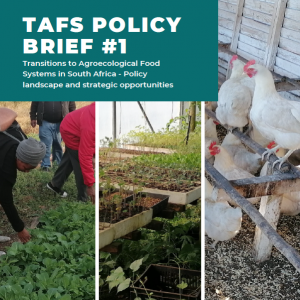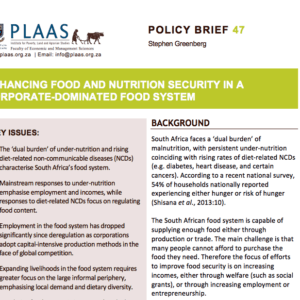TAFS Policy Brief 2: Learning from Local Initiatives for Agroecological Development in South Africa

Synopsis
Transformation of food systems in line with agroecological principles remains marginal in South Africa. In spite of numerous policies, plans and programmes, limited change highlights the weak budgets, segmented interventions and lack of coordination. These problems reflect the power dynamics in the prevailing food system, which is dominated by large-scale conventional agriculture and food corporations.
At the national level, several social movements support agroecology, organic production and food sovereignty. These, however, lack the connection with consumers required to establish a coalition for change that could influence the political scene and lead to policy changes. Consumers are understandably focused on their current living conditions. As a result, no significant agroecological programmes are taking root nationwide.
TAFS Policy Brief 1: Transitions to Agroecological Food Systems in South Africa – Policy landscape and strategic opportunities

Synopsis for an agroecology transition in South Africa
In South Africa, access to food and adequate nutrition is a right enshrined in the Constitution. Yet, hunger is rife and food access is a daily struggle for more than 14 million South Africans (23% of the population), with malnutrition in its various forms being a significant health challenge. In parallel, South African agriculture is increasingly unsustainable in the context of climate change and environmental degradation. Transforming the food system is imperative.
Current approaches to transformation are restricted to incremental adaptations to the dominant agricultural model, primarily using Conservation Agriculture (CA)/Climate Smart Agriculture (CSA) approaches. While these may offer necessary pathways to greater environmental sustainability in commercial agriculture, they fall short of what is needed for transforming the food system.
To effectively address the sustainability crisis, a transformational change is needed where social dynamics must play a major role. This requires support for different producer categories, the development of new food networks supporting local food system dynamics, and improved participation based on consumer-producer collaboration. Progress must be cross-sectoral, throughout the food system, and at multiple levels simultaneously. An agroecological approach can recalibrate this system to achieve both ecological sustainability and social justice.
South Africa is in a position to consolidate these opportunities. Numerous policies, plans and programmes have elements that can be drawn together to underpin a national agroecology strategy and programme. Importantly, a national re-engagement can be facilitated by linking and learning from various local level initiatives where stakeholders can more easily engage in actions targeted at their common challenges. Districts and municipalities can play a major role by supporting synergies between sustainable and local development.
Civil society organisations: CSOs should have a central role in food governance
This policy brief explores the role that civil society organisations can play in addressing food security, building on its contributions during the COVID-19 lockdowns. (Colour version.)
Click here to download a low-resolution, black and white version of the policy brief.
Urban agriculture: Quick fix for urban food insecurity or site of struggle for deep, just food systems change?
This policy brief reflects on the complexities of urban agriculture and its place in addressing food insecurity and poverty.
For a full-colour PDF of the policy brief, download below.
For a black and white, printer-friendly version of the policy brief, click here.
Leveraging informal trade: Governance strategies to cultivate resilient, inclusive food economies
This policy brief explores ways in which government can support the informal economy.
For a black and white, printer-friendly version of the policy brief, click here.
For a full-colour PDF of the policy brief, download below.
Foodways of the poor in South Africa: How poor people get food, what they eat, and how this shapes our food system
Foodways are the set of strategies shaping what food people choose as well as how and where they access and consume it. Informed by culture and social context, the foodways of the poor simultaneously respond to and influence food systems change. South African food systems are in a process of change. These changes are caused by many factors, including urbanisation, consolidation and concentration in food value chains, and changing dietary patterns. These transitions have important consequences for the nature of poverty and food insecurity. In this policy brief, Florian Kroll explores these links between the foodways of the poor and food system transition in South Africa.
Enhancing Food and Nutrition Security in a Corporate Dominated Food System

The South African food system is capable of supplying enough food for its people either through production or trade. At the same time South Africa faces a ‘dual burden’ of malnutrition. Persistent under-nutrition exists alongside rising rates of diet-related NCDs (e.g. diabetes, heart disease, and certain cancers). In this policy brief, Stephen Greenberg looks at the role of the highly concentrated corporate structure of the South African food system and looks at the kinds of interventions that are needed to ensure that poor people can have an adequate diet.